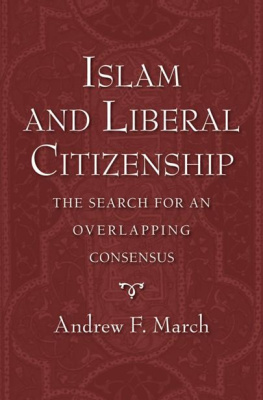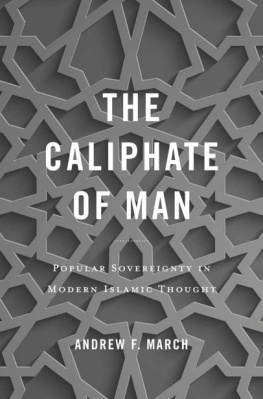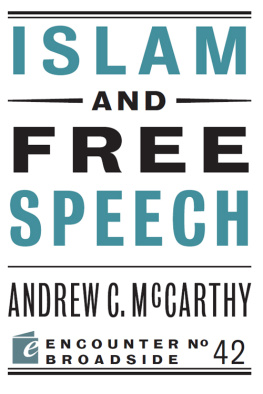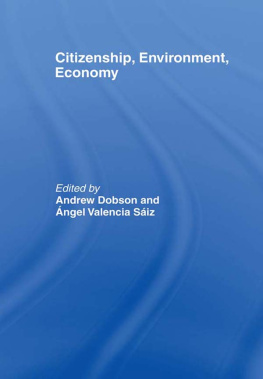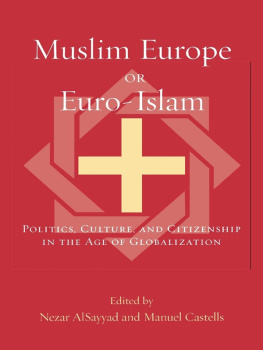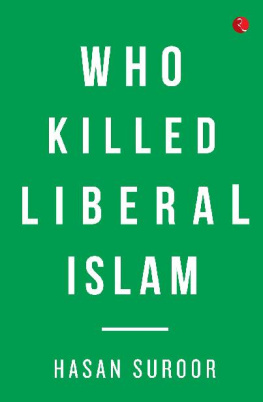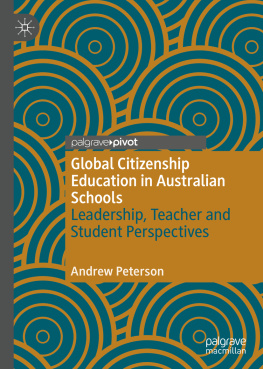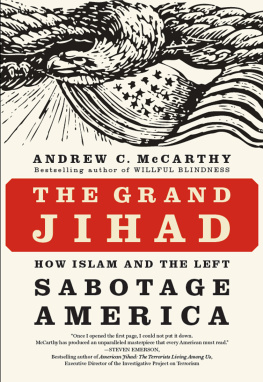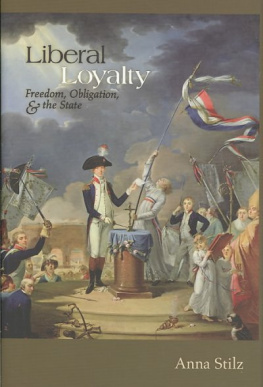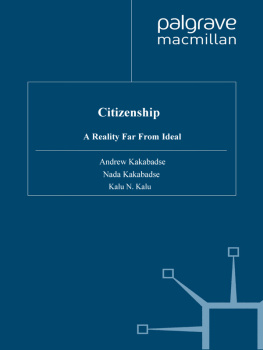Andrew F. March - Islam and Liberal Citizenship
Here you can read online Andrew F. March - Islam and Liberal Citizenship full text of the book (entire story) in english for free. Download pdf and epub, get meaning, cover and reviews about this ebook. year: 2009, publisher: Oxford University Press, genre: Politics. Description of the work, (preface) as well as reviews are available. Best literature library LitArk.com created for fans of good reading and offers a wide selection of genres:
Romance novel
Science fiction
Adventure
Detective
Science
History
Home and family
Prose
Art
Politics
Computer
Non-fiction
Religion
Business
Children
Humor
Choose a favorite category and find really read worthwhile books. Enjoy immersion in the world of imagination, feel the emotions of the characters or learn something new for yourself, make an fascinating discovery.
- Book:Islam and Liberal Citizenship
- Author:
- Publisher:Oxford University Press
- Genre:
- Year:2009
- Rating:4 / 5
- Favourites:Add to favourites
- Your mark:
- 80
- 1
- 2
- 3
- 4
- 5
Islam and Liberal Citizenship: summary, description and annotation
We offer to read an annotation, description, summary or preface (depends on what the author of the book "Islam and Liberal Citizenship" wrote himself). If you haven't found the necessary information about the book — write in the comments, we will try to find it.
Islam and Liberal Citizenship — read online for free the complete book (whole text) full work
Below is the text of the book, divided by pages. System saving the place of the last page read, allows you to conveniently read the book "Islam and Liberal Citizenship" online for free, without having to search again every time where you left off. Put a bookmark, and you can go to the page where you finished reading at any time.
Font size:
Interval:
Bookmark:
ANDREW F. MARCH

2009

Oxford University Press, Inc., publishes works that further Oxford Universitys objective of excellence in research, scholarship, and education.
OxfordNew York
AucklandCape TownDar es SalaamHong KongKarachi
Kuala LumpurMadridMelbourneMexico CityNairobi
New DelhiShanghaiTaipeiToronto
With offices in
ArgentinaAustriaBrazilChileCzech RepublicFranceGreece
GuatemalaHungaryItalyJapanPolandPortugalSingapore
South KoreaSwitzerlandThailandTurkeyUkraineVietnam
Copyright 2009 by Oxford University Press, Inc.
Published by Oxford University Press, Inc.
198 Madison Avenue, New York, New York 10016
www.oup.com
Oxford is a registered trademark of Oxford University Press
All rights reserved. No part of this publication may be reproduced, stored in a retrieval system, or transmitted, in any form or by any means, electronic, mechanical, photocopying, recording, or otherwise, without the prior permission of Oxford University Press.
Library of Congress Cataloging-in-Publication Data
March, Andrew F., 1976
Islam and liberal citizenship : the search for an overlapping consensus /
Andrew F. March.
p. cm.
Includes bibliographical references and index.
ISBN 978-0-19-533096-0
1.Citizenship (Islamic law).2. MuslimsNon-Muslim countries.3. PluralismReligious aspectsIslam.4. LiberalismReligious aspectsIslam.5. CitizenshipEurope.6. LiberalismEurope.7. Islam and secularismEurope. I. Title.
KBP2430.M37 2009
340.59dc222008026903
To my parents
My DPhil dissertation advisors, Michael Freeden and Sohail Hashmi, were as supportive and encouraging of the earliest form of this somewhat experimental project as could possibly be hoped.
Christopher Melchert was exceedingly generous with his time, answering many a banal question, reading overlong chapters, and providing crucial support in my initial efforts to navigate Islamic sourcesall beyond the call of duty for an informal, unofficial mentor. Akram Nadvi and Yahya Michot of the Oxford Centre for Islamic Studies (OXCIS) were generous and patient with my many questions and impromptu office visits. Mark Muehlhaeuser of the OXCIS library provided not only much valuable assistance but also enjoyable company on an almost daily basis for nearly two years. David Miller, Elizabeth Frazer, and Tariq Ramadan provided valuable and much needed critical feedback during the various examinations of the thesis on which this book is based. Guy Kahane and Edward Kanterian provided valuable philosophical perspective and much valued friendship during these years. In addition to the Oxford Centre for Islamic Studies, the staffs of the Bodleian Library (particularly the Radcliffe Camera), the Oxford Oriental Institute Library, and the Institut Franais du Proche-Orient (IFPO) Library (Damascus) were supportive and friendly.
While writing this book, I was supported generously by the Marshall Aid Commemoration Commission, the Beeston Scholarship of St. Johns College (Oxford), and the Becket Institute at Oxford University. Michigan State Universitys James Madison College and Yale Universitys Political Science Department have provided excellent support and working conditions for me since 2005.
) and improved it immensely in the areas of Arabic translation and transliteration, English style and clarity, and factual and interpretive accuracy. I am in his debt. Finally, I would like to thank Theo Calderara of Oxford University Press for his support and patience, as well as the editorial and production staff both known to me (Meechal Hoffman and Linda Donnelly) and unknown, and the copyeditor, Joy Matkowski.
This volume was published with the assistance of the Frederick W. Hilles Publication Fund of Yale University.
A version of was published previously as Liberal Citizenship and the Search for an Overlapping Consensus: The Case of Muslim Minorities, Philosophy & Public Affairs, vol. 34, no. 4 (Fall 2006), 373421.
Parts of were included in Islamic Foundations for a Social Contract in Non-Muslim Liberal Democracies, American Political Science Review, Vol. 101, No. 2, May 2007, pp. 235252.
I discuss some of the themes of in Sources of Moral Obligation to Non-Muslims in the Jurisprudence of Muslim Minorities (Fiqh al-aqalliyyt) Discourse, Islamic Law and Society, 16:1 (2009).
My constant companion, joy, and reason for being for the last decade has been my son, Tamir, who has had a vague awareness of this books preparation. That his awareness has been so vague, and the impact of the work involved for this book on him so slight, is due in great measure to his grandparents, to whom goes my immense, but insufficient, gratitude. That this book is not better is due to many factors, but the most tangible of them is the fact that it was produced in its substance prior to the advent of my wife, Naz. In the subsequent two years, I have been blessed with a glimpse of the conditions of joy, inspiration and intellectual partnership in which all my future endeavors will unfold. It is already difficult to recognize what came before.
This book examines whether Muslims, qua Muslims, can regard as religiously and morally legitimate the terms of citizenship in a non-Muslim liberal democracy. This involves asking what is involved doctrinally in constructing as religiously legitimate practices such requirements as living in and being loyal to a non-Muslim state, regarding non-Muslims as political equals with whom one might cooperate socially and politically, contributing to non-Muslim welfare, and participating in non-Muslim political systems.
Although I am focusing in this book specifically on the relationship between Islamic doctrine and liberal citizenship, the inquiry itself is a generic one. All religious and philosophical doctrines or, indeed, noncomprehensive collections of beliefs and preferences can be presumed to provide their bearers with a wide set of motivations for action, some of which may conflict with liberal terms of social cooperation. These questions would be of interest even without the recent public examples of value conflict in Western societies, simply because Islam is an important comprehensive doctrine that has achieved a critical presence in existing liberal democracies recently enough for there not to exist a significant philosophical literature on its relationship to liberalism and citizenship. Lest it be thought that asking these questions suggests a particular background suspicion or mistrust of Islamic political ethics, it should be borne in mind not only that these questions can be and are posed to all non-Islamic doctrines flourishing in liberal societies but also that these very questions are the subject of earnest, and constant, internal debate among Muslim religious scholars and intellectuals. That internal debate provides the material for this book.
however, the present study is, rather, a work of political theory that seeks to analyze Islamic (as opposed to Muslim) attitudes toward shared citizenship through a methodology of comparative political ethics. It is a study of Muslim citizenship in non-Muslim liberal democracies as a religious problem for believing Muslims.
The questions raised in this book are familiar ones, as is their framing. They are echoed in the popular and academic discussions of whether Islam might be compatible with some core liberal value or institutiondemocracy, human rights, gender equality, just war theory, or even modernity at large. There are many good reasons to be skeptical of or dissatisfied with such questions and approaches. They may encourage either a stereotypical negative treatment of Islamic ethics or, alternatively, a superficial and unserious dismissal of the reality of genuine (and perhaps reasonable) moral disagreement. They may confuse the explanatory order of things by thinking that political goals are determined by ideological, moral, or religious beliefs.
Font size:
Interval:
Bookmark:
Similar books «Islam and Liberal Citizenship»
Look at similar books to Islam and Liberal Citizenship. We have selected literature similar in name and meaning in the hope of providing readers with more options to find new, interesting, not yet read works.
Discussion, reviews of the book Islam and Liberal Citizenship and just readers' own opinions. Leave your comments, write what you think about the work, its meaning or the main characters. Specify what exactly you liked and what you didn't like, and why you think so.

